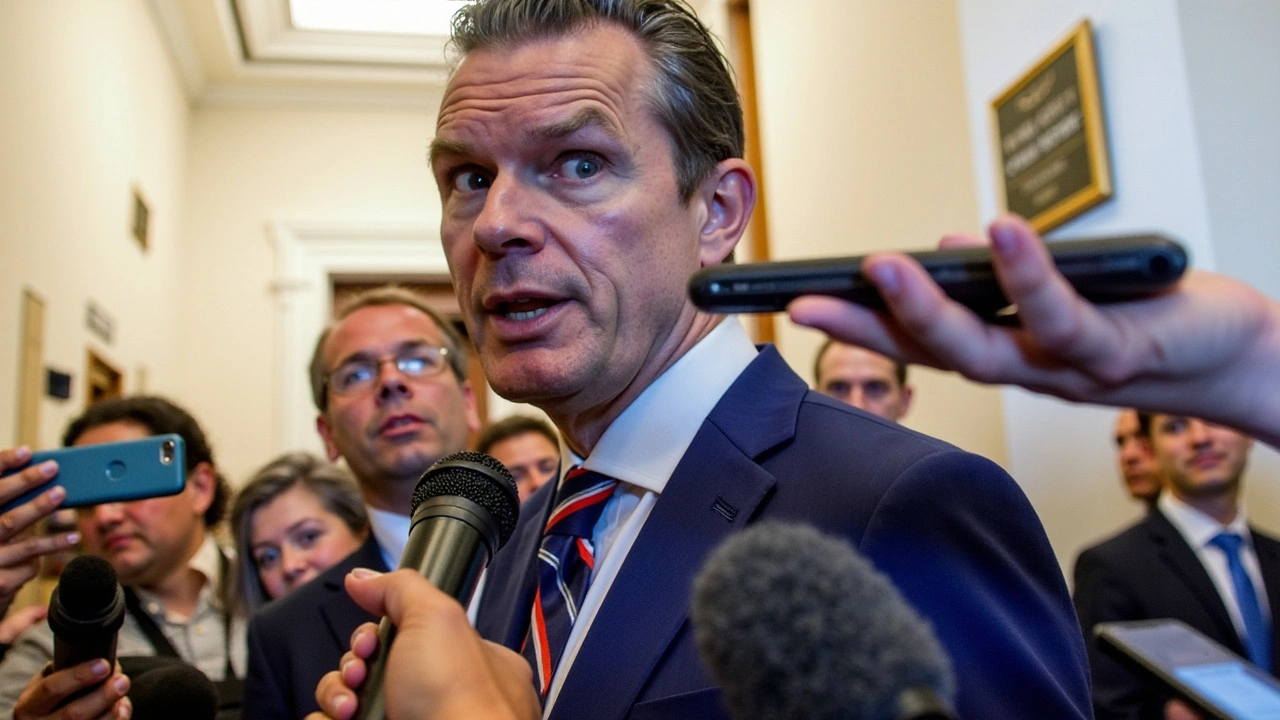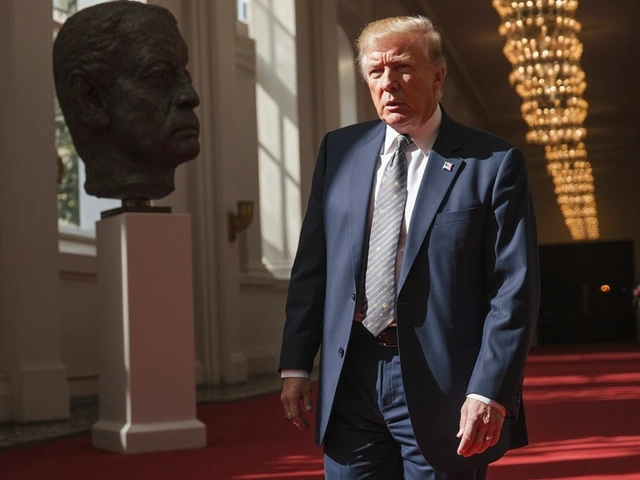Pete Hegseth's Defense Confirmation Hearing: Key Statements and Implications
The Senate Armed Services Committee room was abuzz with activity as Pete Hegseth, nominated as Secretary of Defense, took center stage at the Dirksen Senate Office Building on January 14, 2025. The stakes were high as Hegseth aimed to convince the committee and the American public of his capability to lead one of the most critical departments in the federal government. Observers, both supportive and skeptical, watched eagerly from the gallery, while millions tuned in via live broadcasts on channels like C-SPAN and platforms like YouTube.
Hegseth's confirmation hearing opened with a firm and unmistakable pledge of dedication. He clearly stated his commitment to serving the nation, which resonates deeply in a country where military readiness is a top priority. The nominee emphasized the necessity of a capable and robust US military force to protect and serve the country amidst growing global challenges. This resonated with many who share concerns about national security and the overarching need for an effective defense strategy. However, others questioned the practicality of his promises, given the fiscal constraints and political challenges ahead.
Strategic Priorities in Focus
As is customary in such hearings, the nominee was tasked with outlining his strategic priorities, a critical component of the hearing that reflects his vision for the Department of Defense's future direction. Hegseth did not shy away from this task, presenting a clear-cut agenda that places an unprecedented emphasis on countering China. This emphasis is no surprise considering the geopolitical climate, as China's rapid military advancements and strategic expansions pose significant challenges to US interests around the globe. Beyond countering China, Hegseth also prioritized military modernization and reinforcing alliances, which he described as indispensable pillars for sustaining US military supremacy in the coming years.
The nominee's focus on enhancing military modernization received widespread attention. With technologies evolving at neck-breaking speed, modernizing the defense apparatus remains a critical need. Hegseth outlined plans to adopt cutting-edge technology to maintain America's competitive edge, although he stopped short of detailing specific technologies or programs. His strategic vision aims at overhauling current practices to ensure they align with contemporary technological advancements.
Budget and Resource Allocation
Hegseth's testimony also delved into one of the more contentious issues facing the defense department: the budget. With mounting public debt and calls for fiscal responsibility echoing in congressional halls, the question of appropriate budget allocation looms large. Hegseth addressed this head-on, advocating for efficient and strategic resource allocation to tackle emerging threats without compromising fiscal responsibility. He argued for a defense budget that aligns with the nation's strategic objectives while also ensuring taxpayers’ money is used judiciously.
His discussions on budgetary considerations appeared to acknowledge the spreading concern of overspending, a topic that isn't new in defense circles. The need for prioritizing spending to focus on highly impactful areas was part of his narrative, though some lawmakers pressed him for more concrete plans and accountability structures in place to curb unwarranted expenditures.
Force Structure and Modernization
Regarding force structure and modernization, Hegseth stood resolute, articulating the necessity to keep pace with evolving threats through strategic adaptions. The nominee underscored the significance of adjusting the force structure to meet contemporary challenges, thus making it an essential talking point in his blueprint for the department. Modern warfare demands dynamism, and Hegseth was clear about ensuring the military's capacity to respond with agility.
The future of force structure involves complex decision-making processes regarding troop size, equipment, and training, all of which Hegseth acknowledged needed adaptive strategies. This approach clearly struck a balance between maintaining traditional force readiness and pivoting towards technologically sophisticated warfare, showcasing his understanding of the convoluted defense landscape.
Ethics and Leadership
No hearing examining a potential Secretary of Defense would be complete without exploring their ethical grounding and leadership style. Hegseth faced probing questions about his past comments and actions. Under scrutiny, the nominee responded by accentuating his allegiance to the Department of Defense's values and ethical standards, vowing to uphold the integrity of the office he aims to hold.
The committee was particularly interested in ensuring that Hegseth's leadership will be both transparent and accountable. Throughout the hearing, he remained steadfast in addressing ethical concerns, reinforcing his belief in ethical leadership not just as a guiding principle but as a practice he intends to implement at all institutional levels. He spoke candidly about the significance of leading by example, pledging to foster a culture of ethics and integrity throughout the department.
Conclusion and Next Steps
As the hearing drew to its conclusion, lawmakers and citizens alike were left to weigh Hegseth's commitments against the realities of governance. The Senate Armed Services Committee now has the critical task of reviewing his testimony, examining his plans, and considering his viability as Secretary of Defense. The decision will be pivotal, not just for Hegseth but for the future direction of US military policy and its impacts on global security.
Whether Hegseth will be confirmed remains a point of suspense, but what his hearing underscored was a nominee prepared to address contemporary challenges with an approach that aims to balance strength, innovation, and values. As the nation waits for the committee's decision, proponents and critics alike will continue to analyze the potential implications of Hegseth's vision on the defense landscape.







Michael Laffitte
January 15, 2025 AT 19:55 PMHegseth’s pledge to modernize our forces reads like a rally‑cry for the 21st‑century battlefield. He’s talking about AI, hypersonics, and a whole new wave of network‑centric warfare, and that honestly pumps me up. The emphasis on countering China feels right on the money when you look at the headlines daily. If he can actually pull the budget needle without tearing the fiscal fabric, we might finally see the kind of edge we need.
sahil jain
January 16, 2025 AT 01:28 AMWhoa, the way Hegseth laid out the modernization roadmap was 🔥. He’s not just talking fluff; he actually mentioned ramping up autonomous platforms and tighter allied integration. That kind of forward‑thinking could be the game‑changer we’ve been waiting for.
Bruce Moncrieff
January 16, 2025 AT 07:02 AMTotally felt the surge when he talked about autonomous drones-like the future is already knocking on the door. The only thing missing is a hard timeline, but hey, who needs exact dates when the vision’s so vivid? Let’s hope the Senate catches that vibe and backs it up.
Dee Boyd
January 16, 2025 AT 12:35 PMThe hearing turned into a verbosity contest, littered with buzzwords like “strategic realignment” and “force posture optimization” that sound impressive but mask a lack of substantive policy. While Hegseth touts ethical leadership, the absence of concrete accountability mechanisms is glaring, suggesting a performative stance rather than genuine reform.
Carol Wild
January 16, 2025 AT 18:08 PMReading Hegseth’s testimony feels like watching a rehearsal for a grandiose theater production where every line is crafted to dazzle the audience without revealing the backstage chaos. He promises a “robust” military while the nation’s debt ceiling trembles under the weight of endless spending. The emphasis on counter‑China is not a fresh insight; it’s the same refrain echoed by every pundit for the past decade. Modernization, he says, but he skirts around which legacy systems will actually be retired. Without clear milestones, “cutting‑edge technology” becomes a vague marketing slogan. The budget narrative is riddled with vague phrases like “efficient allocation,” which in reality often translates to reallocating funds from other critical programs. He glosses over the ethical implications of autonomous weaponry, a topic that should dominate any serious defense dialogue. The focus on alliances is commendable, yet the details of burden‑sharing remain conspicuously absent. Every time a senator asks for specifics, Hegseth evades with platitudes, betraying a lack of preparedness. The public expects transparency, not the smoke and mirrors that he seems comfortable employing. Moreover, the mention of “ethical leadership” feels hollow when juxtaposed with his past controversial statements. The hearing audience, both in the gallery and online, can sense the dissonance between rhetoric and reality. While some may applaud his optimism, optimism without concrete plans is merely wishful thinking. The defense establishment cannot thrive on optimism alone; it requires actionable strategies, clear timelines, and measurable outcomes. In short, Hegseth’s performance was a meticulously packaged promise wrapped in the language of progress, yet it left the critical question unanswered: will he deliver, or will his words dissolve into the next lobby‑filled budget cycle?
Rahul Sharma
January 16, 2025 AT 23:42 PMExcellent breakdown. To turn those buzzwords into reality, we need a transparent roadmap: specific technology programs, clear de‑obsolescence timelines, and an auditing body that reports quarterly to Congress. That’s the only way to prevent the usual budget gymnastics.
Emily Kadanec
January 17, 2025 AT 05:15 AMHonestly, the whole thing sounded like a lot of fluff. Hegseth's got no real plan, just big words and promises.
william wijaya
January 17, 2025 AT 10:48 AMThe hearing certainly highlighted the tension between strategic necessity and fiscal prudence. While Hegseth’s vision aligns with contemporary warfare doctrines, the lack of detailed acquisition pathways raises concerns about sustainability.
Lemuel Belleza
January 17, 2025 AT 16:22 PMSeems like another political show.
faye ambit
January 17, 2025 AT 21:55 PMThe ethical dimension of defense leadership cannot be reduced to rhetoric alone; it demands a consistent moral compass that guides decision‑making beyond partisan pressures. Hegseth’s statements, while superficially aligned with integrity, must be examined against his historical record to assess genuine commitment.
Subhash Choudhary
January 18, 2025 AT 03:28 AMTrue, philosophy aside, the real test will be how he handles the inevitable trade‑offs between mission success and resource constraints.
Ethan Smith
January 18, 2025 AT 09:02 AMWhile the enthusiasm is palpable, we must remember that without legislative support and clear statutory authority, even the most visionary programs can stall. A disciplined approach to budgetary alignment is essential.
Evelyn Monroig
January 18, 2025 AT 14:35 PMDon’t be fooled – the defense budget is a smokescreen for a deeper agenda. Behind the modernization narrative lies a covert push for increased surveillance and control of the populace, orchestrated by a cabal of defense contractors who profit from perpetual war.
Gerald Hornsby
January 18, 2025 AT 20:08 PMAh, the theater of power continues. 🎭
Hina Tiwari
January 19, 2025 AT 01:42 AMWhile the concerns sound extreme, there is merit in scrutinizing the influence of defense contractors on policy decisions. Transparency is non‑negotiable.
WILL WILLIAMS
January 19, 2025 AT 07:15 AMYo, if Hegseth can actually lock in those AI upgrades, we might finally get the edge we need!
Barry Hall
January 19, 2025 AT 12:48 PMSolid points all around. 👍
abi rama
January 19, 2025 AT 18:22 PMLet’s keep the conversation constructive and focus on how we can collectively push for the necessary reforms without getting bogged down by partisanship.
Megan Riley
January 19, 2025 AT 23:55 PMAbsolutely! It’s vital we stay optimistic, yet grounded; by sharing credible data and fostering open dialogue, we can influence policy in a positive direction. Together we can make a difference! 😊
Lester Focke
January 20, 2025 AT 05:28 AMIn summation, the discourse surrounding Hegseth’s confirmation reveals a microcosm of the broader strategic dilemma: reconciling aspirational defense imperatives with the pragmatic constraints of fiscal stewardship and democratic oversight.